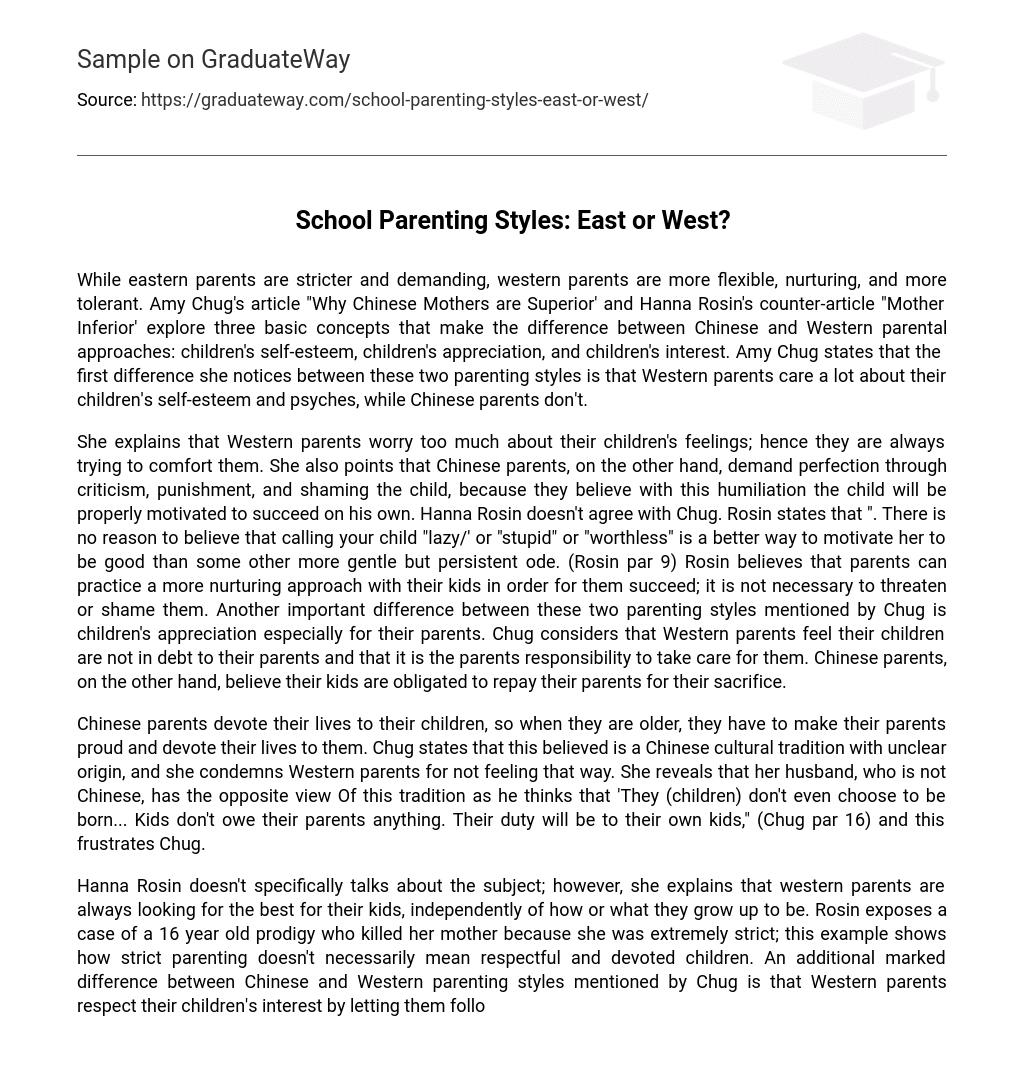While eastern parents are stricter and demanding, western parents are more flexible, nurturing, and more tolerant. Amy Chug’s article “Why Chinese Mothers are Superior’ and Hanna Rosin’s counter-article “Mother Inferior’ explore three basic concepts that make the difference between Chinese and Western parental approaches: children’s self-esteem, children’s appreciation, and children’s interest. Amy Chug states that the first difference she notices between these two parenting styles is that Western parents care a lot about their children’s self-esteem and psyches, while Chinese parents don’t.
She explains that Western parents worry too much about their children’s feelings; hence they are always trying to comfort them. She also points that Chinese parents, on the other hand, demand perfection through criticism, punishment, and shaming the child, because they believe with this humiliation the child will be properly motivated to succeed on his own. Hanna Rosin doesn’t agree with Chug. Rosin states that “. There is no reason to believe that calling your child “lazy/’ or “stupid” or “worthless” is a better way to motivate her to be good than some other more gentle but persistent ode. (Rosin par 9) Rosin believes that parents can practice a more nurturing approach with their kids in order for them succeed; it is not necessary to threaten or shame them. Another important difference between these two parenting styles mentioned by Chug is children’s appreciation especially for their parents. Chug considers that Western parents feel their children are not in debt to their parents and that it is the parents responsibility to take care for them. Chinese parents, on the other hand, believe their kids are obligated to repay their parents for their sacrifice.
Chinese parents devote their lives to their children, so when they are older, they have to make their parents proud and devote their lives to them. Chug states that this believed is a Chinese cultural tradition with unclear origin, and she condemns Western parents for not feeling that way. She reveals that her husband, who is not Chinese, has the opposite view Of this tradition as he thinks that ‘They (children) don’t even choose to be born… Kids don’t owe their parents anything. Their duty will be to their own kids,” (Chug par 16) and this frustrates Chug.
Hanna Rosin doesn’t specifically talks about the subject; however, she explains that western parents are always looking for the best for their kids, independently of how or what they grow up to be. Rosin exposes a case of a 16 year old prodigy who killed her mother because she was extremely strict; this example shows how strict parenting doesn’t necessarily mean respectful and devoted children. An additional marked difference between Chinese and Western parenting styles mentioned by Chug is that Western parents respect their children’s interest by letting them follow their desires and supporting their preferences.
Chinese parents, on the other hand , ” . Believe that they know what is best for their children and therefore override all oftener children’s own desires and preferences. ” (Chug par 1 7) Chug considers children still don’t know what they want or what is best for them, so it is the parents’ responsibility to decide for them; it doesn’t really matter if the child likes or dislikes the decision. It is the parent who makes the final choice. Chug claims Chinese mothers know best when it comes to raising children to become successful. Rosin’s idea of raising children is different.
She wants her children to be happy, and in fact she has never pressured her children to make any decision or play a specific instrument. Hanna Rosin believes “It is better to have a happy, moderately successful child than a miserable high- achiever. ” (Rosin par 12) Rosin is the extreme opposite of Chug; she believes children should grow up making their own decisions without parents’ pressure. While parenting for Chinese is like a dictatorship aimed to succeed, parenting for Americans is more about providing children a happy childhood because it is one of the most important ND memorable times of life.
Amy Chug believes that children’s self-esteem should not be a factor to influence parenting methods; instead it can be used “against” children to help them be more motivated. She believes that Chinese children are eternally indebted to their parents and that this attitude makes Chinese parenting better. Finally, she believes that no matter what the children want, it is the parent who knows what is best for them. In contrast, Hanna Rosin believes that children’s self-esteem is important, and they should be treated in a gentle way.
She believes that strict parenting doesn’t necessarily mean better, happy or grateful children. Finally, she believes that children should be entitled to decide what they want in their lives. As a final point, I would like to mention that Chug, Rosin, and millions and millions of parents around the world only want the best for their children. It is not proper to judge somebody approach because cultural elements are involved; what is important is that all parental behavior, which may involve a mix of several approaches, contributes to the happiness of the children.





